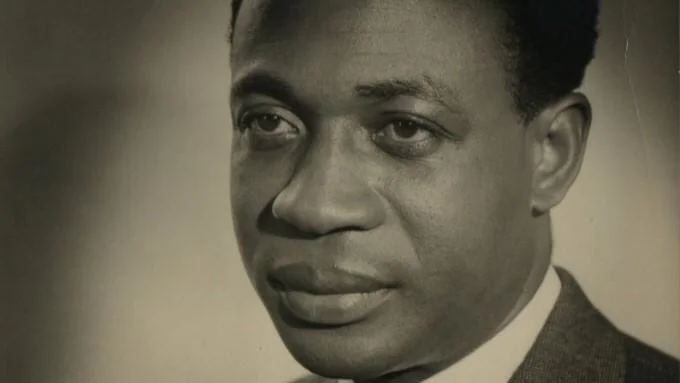Kwame Nkrumah

From LSE to the presidency

Kwame Nkrumah, a former PhD candidate at LSE, was the first prime minister of a post-colonial African nation. From that unique position, he observed the forces that shaped Africa and the world in the second half of the 20thcentury. He was a driving force behind the practical and ideological underpinnings of Pan-Africanism and our understanding of neo-colonialism.
Nkrumah was born in what is now Ghana but was then called the Gold Coast, in 1909. He emigrated to pursue his education and in May 1945 he enrolled as a PhD candidate in anthropology at LSE before transferring to University College to study philosophy under AJ Ayer.
While in the UK, he attended the highly influential 5thPan-African Congress in Manchester, which featured three future heads of state: Hastings Banda of Malawi, Jomo Kenyatta of Kenya, and Nkrumah. He returned to Ghana in 1947 and joined the country’s first political party, the United Gold Coast Convention (UGCC) which sought self-governance at the earliest opportunity.
After internal divisions with the other leading members of the UGCC, he formed the Convention People’s Party in 1949. He was imprisoned in 1950 after supporting a general strike that turned violent. In the 1951 general election, Nkrumah’s party won 34 out of the 38 seats, despite him being in prison throughout the campaign.
He became prime minister of the Gold Coast on the creation of the role in 1952 and became independent Ghana’s first prime minister in 1957. In 1964, a constitutional amendment made Nkrumah president for life, but he was deposed in a military coup in 1966 while on a diplomatic visit to North Vietnam.
For the remaining years of his life, Nkrumah settled in Guinea-Conakry. He died in Bucharest, Romania in 1972 while undergoing treatment for prostate cancer.
Neo-colonial thought
As well as being the first democratic leader of a post-colonial African nation, Nkrumah has a substantial legacy as a political theorist. He is credited with being the first to apply the term ‘neo-colonialism’ to the experience of Africa in the 20thcentury (although Jean-Paul Sartre is believed to have coined the term in the 1950s).
Nkrumah was a Marxist, and he believed that despite being granted formal independence, there were financial structures that prevented the development of Africa for the benefit of Africans, and instead continued to enrich the people and institutions in former colonial powers.
Upon independence, African states, faced with a power vacuum and a desire to fund programmes to develop their countries, welcomed in aid, finance, and international corporations. This created a new scramble for Africa, Nkrumah argued, but this time at the behest of local elites.
The arrival of aid brought with it conditions that restricted the political decision making of the newly independent governments. Countries were happy to give aid but wanted to retain control over how it was spent. In this way, former imperial powers maintained control over the governments and budgets of their former colonies.
Aid became a tool of great power rivalry, created international spheres of influence, and introduced vested interests into domestic politics that restricted decision making. After the initial rush, the areas of spending donors regarded as safe for aid shrank. From Nkrumah’s point of view, the only thing donors were always happy to spend money on was military aid that ended up protecting the government from domestic unrest caused by a lack of development as a result of restrictive, non-responsive, and neo-colonial aid policies.
The loans that flooded into Africa post-independence, while good intentioned, meant that quickly, new governments spent money servicing debts rather than investing in their populations. Economies were generating wealth only for that money to be sent to banks and treasuries in the West, which created a system of wealth extraction similar to the colonial system, just dressed in the trappings of bankers rather than colonial officials. Africa had swapped the pith helmet for the pin-striped suit.
The forces that unite us are intrinsic and greater than the superimposed influences that keep us apart
Many African countries are rich in natural resources and upon independence, many were keen to exploit these to help fuel their spending priorities and boost their economies. But in many instances, it was international companies who came in to set up the business. They established extractive industries across Africa, removed the resources and performed the refinement, manufacturing and wealth creation elsewhere. The result? Again, Africa’s resources were making non-Africans very rich.
For Nkrumah, neo-colonialism manifested as an unequal economic system where the economic interests of Africans were subservient to those of international finance, extraction industries, and geopolitics, even within their own "independent" country.
Nkrumah wrote about the experience of Africa in the late 1960s in his most famous work Neo-colonialism: The last stage of imperialism.
Pan-Africanism
Nkrumah was a pan-Africanist. He believed that there was a bond that, despite the continent’s myriad ethnic groups, united all Africans both on the continent and in the diaspora. Although he became disenchanted with the Organisation for African Union (the forerunner of the African Union), he advocated for the creation of an African common market, a common currency, and a central continental bank.
"The core of the Black revolution is in Africa, and until Africa is united under a socialist government, the Black man throughout the world lacks a national home. Africa is one continent, one people, and one nation."
According to Nkrumah, this revolution had only two basic principles: equality for all people and races, and solidarity between the oppressed peoples of all nations.
Nkrumah believed Africa needed its own ideology and philosophy to harmonise the traditional African thought, Euro-Christian, and Islamic ideologies that existed across the continent, but he never completed the task.
In exile
In later life, Nkrumah’s outlook grew more militant. Having made his name as a democratic leader, he now came to view military action as necessary for Africa to reach its potential. In the milieu of the Vietnam War, socialist revolutions in Latin America, and his own experiences of the coup in Ghana, Nkrumah abandoned the political path that had taken him to power and began to advocate for armed struggle.
From the late 1960s onwards, Nkrumah saw Africa’s post-colonial struggles as intrinsically linked with a worldwide socialist revolution, and violence as essential to remove the vestiges of neo-colonialism.
"Revolutionary warfare is the logical, inevitable answer to the political, economic and social situation in Africa today. We do not have the luxury of an alternative."
Legacy
"Kwame Nkrumah can only be understood in the context of the historical time in which he lived – that is, during British colonial rule in Africa and at a time when imperialism was being vigorously challenged by black and brown people around the world. Nkrumah championed the end of colonial rule not just in his native Gold Coast, present day Ghana, but went on to declare that, 'Our independence is meaningless unless it is linked up with the total liberation of Africa'. These words demonstrated his profound commitment to African unity or Pan-Africanism. He therefore devoted Ghana’s meagre resources to assisting freedom fighters around Africa to secure their independence and was vilified by his detractors, such as Peter Omari, for sacrificing Ghana’s freedom on the 'altar of Pan-Africanism'. Nkrumah's prodigious intellectual legacy can be interrogated by new generations on the African continent and in the diaspora, as well as progressive peoples around the world to consider their continued relevance in the 21st century." Ama Biney, Lecturer in Black British History, University of Liverpool.
"Nkrumah’s incisive critique of neo-colonialism remains central to a decolonial critique of African external relations. Nkrumah correctly warned that foreign powers – especially European states – would utilise aid, trade, finance and security interventions to keep African former colonies economically, and politically, subordinate to external interests." Mark Langan, Senior Lecturer in International Political Economy, King’s College London.
Recommended works
Consciencism: Philosophy and the Ideology for Decolonization.
Neo-Colonialism: The Last Stage of Imperialism.
Ghana: Autobiography of Kwame Nkrumah.
Photo credit: The National Archives